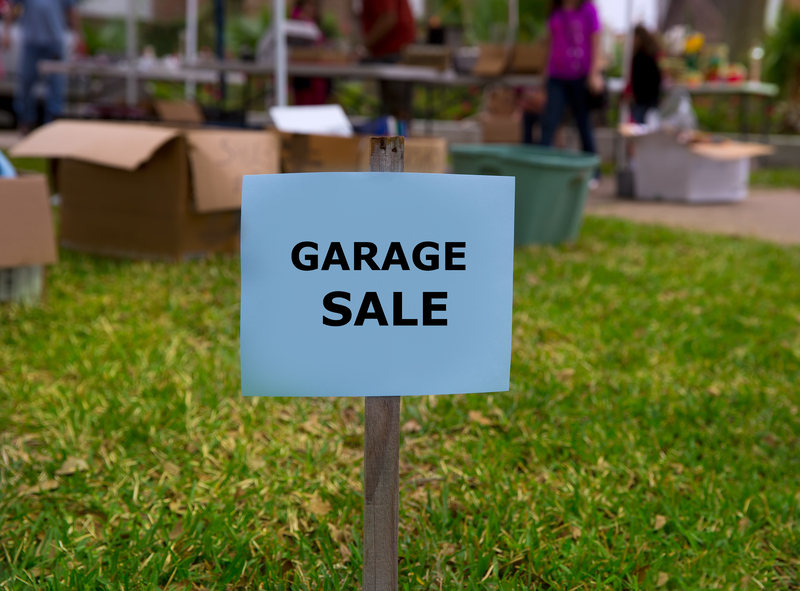Compassionate Hoarder Clean Up for Renewed Peace of Mind
Are you or a loved one struggling with hoarding disorder? Do you feel overwhelmed by clutter and desire a fresh start? Compassionate hoarder clean up is the answer for families and individuals seeking to transform their living spaces into safe, healthy environments. In this comprehensive guide, we'll discuss how to approach hoarder clean up with empathy, explore effective hoarding clean up methods, and reveal how true compassion can restore peace of mind for everyone involved.

Understanding Hoarding Disorder and Its Impact
Before talking about clean up, it's crucial to understand hoarding disorder and its profound effects on mental health and daily living. Hoarding goes far beyond collecting. It is a recognized mental health disorder characterized by persistent difficulty in parting with possessions, regardless of their actual value. This results in severe clutter, distress, and safety hazards.
- Emotional toll: Hoarding can cause shame, social isolation, and family conflict.
- Physical dangers: Excessive clutter can increase the risk of falls, fire hazards, and health issues due to unsanitary conditions.
- Property damage: Overfilled spaces may develop structural problems, mold, and infestations.
- Financial burden: Hoarding can lead to costly repairs, lost property value, or even eviction.
Recognizing these challenges is the first step in initiating a successful, respectful hoarder clean up process.
The Power of Compassionate Hoarder Clean Up
Cleaning up after hoarding is not just about trash removal; it's about respecting the individual's feelings, memories, and unique struggles. A compassionate approach means addressing emotional needs along with the practical aspects of cleaning. This elevates the clean up experience from simply clearing clutter to supporting healing and renewal.
Why Compassion Matters in Hoarder Clean Up
- Reduces resistance: Treating the hoarder with empathy lowers anxiety and increases cooperation.
- Builds trust: A non-judgmental team or loved one can help the hoarder accept help more willingly.
- Encourages sustainable progress: Compassionate support helps ensure that the clean up is lasting, not just a one-time event.
- Respects dignity: The individual feels valued, preventing further trauma or emotional harm.
Steps to a Compassionate Hoarder Clean Up
Ready to embark on the journey to clutter-free living? Here's how to ensure your hoarder clean up is thorough, sensitive, and truly transformative.
1. Open Communication and Planning
Start by having an honest conversation about the need for clean up. If you're helping a loved one, express concern for their wellbeing, not criticism about their belongings. Involve the person in planning, and set realistic goals together.
- Listen without judgement: Create a safe space for the hoarder to share their feelings.
- Set achievable milestones: Break the process into smaller, manageable steps.
- Discuss privacy concerns: Ensure their personal items and memories are handled respectfully.
2. Assemble a Compassionate Clean Up Team
A successful hoarder clean up relies on support--from family, friends, or professional hoarder clean-up specialists. Look for team members who are patient, empathetic, and discreet. If possible, engage professionals experienced in compassionate decluttering services.
- Family and friends: Choose only those who understand the process and will not shame or rush the individual.
- Professional cleaners: Hire reputable teams trained in sensitive hoarding clean up situations and biohazard clean up when necessary.
- Mental health professionals: Therapists or counselors can help manage anxiety and foster progress.
3. Safety First: Assess Risks and Prepare
Hoarder homes often contain health and safety hazards--mold, animal waste, sharp objects, or structural damage. Before beginning, conduct a safety assessment:
- Wear protective clothing, gloves, and masks.
- Ensure proper ventilation.
- Keep a first-aid kit handy.
- Identify and secure exits in case of emergencies.
- Call in experts if you find biohazards, pests, or structural issues.
Your safety and the dignity of the hoarder are equally important throughout the clean up journey.
4. The Clean Up Process: Compassionate Decluttering Step by Step
Follow a structured, respectful process to efficiently declutter and clean:
-
Sort belongings:
- Work together with the individual to go through items room-by-room.
- Use boxes or bins labeled "Keep," "Donate," "Recycle," and "Discard."
- Honor sentimental items and take breaks to minimize overwhelm.
-
Remove unwanted items:
- Arrange for junk removal, recycling, or donation pickup.
- Dispose of hazardous materials appropriately.
-
Deep cleaning and repairs:
- Thoroughly clean surfaces, carpets, and fixtures.
- Address repairs, such as leaks or damage caused by clutter.
-
Restore livable spaces:
- Organize the remaining belongings.
- Rearrange furniture for better access and safety.
Remember, the goal is not just a tidy house--it's a home where the individual feels safe, supported, and valued.
5. Emotional Support and Aftercare
The process of clearing decades of clutter can bring up strong emotions--grief, anxiety, even relief. Be understanding, patient, and supportive. Encourage ongoing therapy or support groups to reduce the risk of relapse and help maintain a clutter-free, peaceful environment.
- Celebrate progress, no matter how small.
- Check in regularly for encouragement and accountability.
- Help develop new routines and organizational habits.
Benefits of Compassionate Hoarder House Cleaning
Approaching hoarder clean up with empathy and care brings about far-reaching benefits:
- Improved safety: Reduces hazards and improves fire exits, air quality, and overall health.
- Enhanced mental wellbeing: Less clutter equals reduced anxiety, stress, and shame.
- Restored relationships: Families can reconnect and enjoy time together in a welcoming home.
- Financial relief: Home repairs, property values, and even legal issues can be addressed proactively.
- Sustainable change: With compassionate support, individuals are more likely to maintain their tidy space and seek help in the future.
When to Hire Professional Hoarder Clean Up Services
While some families tackle clean up on their own, many find it best to hire a professional hoarder clean up company. Here's when to consider outside help:
- The home presents serious health or safety risks (mold, pests, biohazards).
- The process is overwhelming emotionally or physically for the family.
- A large volume of clutter must be removed quickly (for real estate sales or impending deadlines).
- The individual is unwilling but the situation is urgent (code violations, eviction threats).
Experienced hoarding clean-up specialists bring compassion, expertise, and efficiency, ensuring no area is overlooked.
What to Expect from Compassionate Hoarder Clean Up Services
- Discreet, judgment-free assistance
- Thorough sorting, removal, and cleaning
- Proper handling of valuable or sensitive items
- Biohazard remediation if needed
- Resources for ongoing support, including referrals to counselors or social services
When searching for a service, look for companies that emphasize compassion, confidentiality, and experience with hoarding situations. Read reviews and ask about training in sensitive clean up methods.
Tips for Maintaining a Clutter-Free, Calm Space After Hoarder Clean Up
The journey doesn't end after the last bag of clutter is hauled away. Maintaining peace of mind and a tidy environment is a continuous process. Here's how to sustain the benefits of your compassionate hoarder house cleaning:
- Establish daily or weekly routines: Even 15 minutes daily can keep clutter in check.
- Minimize new items: Before bringing something in, thoughtfully consider if it's needed.
- Create designated storage: Use bins, shelves, and labels to stay organized.
- Recognize triggers: Work with a therapist to understand and manage the root causes of hoarding tendencies.
- Build a support network: Family, friends, or support groups offer encouragement and accountability.

Frequently Asked Questions About Compassionate Hoarder Clean Up
Q: How long does a hoarder clean up take?
A: The timeline varies by the extent of clutter and the size of the home. A single room might take a day; an entire house could require several days to weeks. Compassionate clean ups move at a pace comfortable for the individual.
Q: Will my privacy be protected during the clean up?
A: Reputable hoarder cleaning companies and professionals respect confidentiality and discretion. Personal stories and items are handled with the utmost care.
Q: What if the individual resists help?
A: Resistance is common but often rooted in shame and anxiety. Maintaining a compassionate, non-judgmental attitude lays the foundation for trust and eventual acceptance. In some cases, counseling may be necessary before or during the decluttering process.
Q: What if biohazards or mold are found?
A: Professional hoarder clean up specialists are trained in handling hazardous materials. They'll use protective gear and follow safety protocols to ensure a thorough, safe clean up.
Conclusion: Compassionate Hoarder Clean Up as a Path to Renewal
The journey from overwhelming clutter to renewed peace of mind is challenging--but entirely possible with compassionate hoarder clean up. Whether you're a family member, friend, or professional cleaner, approaching the process with patience and empathy can restore dignity and joy to even the most chaotic spaces. By blending practical organization, emotional support, and aftercare, you'll enable a lasting transformation for yourself or your loved one.
If you or someone you know is facing hoarding disorder, remember: You are not alone. Help is available, and with the right approach, every home can become a safe, serene haven once more.
- Seek out experienced, empathetic hoarder cleaning services if needed.
- Involve mental health support for lasting success.
- Celebrate each step towards clutter-free, peaceful living.
Begin your path to renewed peace of mind through compassionate hoarder clean up today.